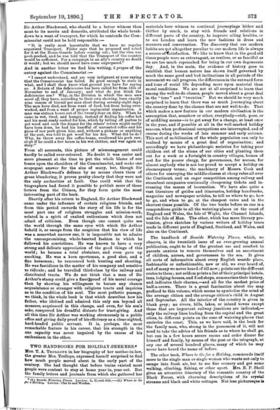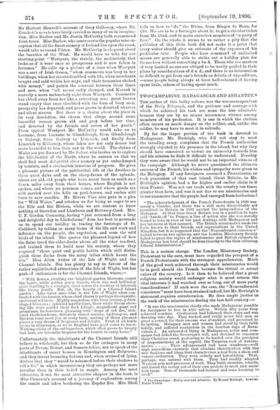TWO HANDBOOKS FOR HOLIDAY-SEEKERS.* MRS. T. A. TROLLOPE in her
biography of her mother-in-law, the greater Mrs. Trollope, expressed herself surprised to find fiew much people moved about in the early part of the century. She had thought that before trains existed most people were content to stay at home year in, year out. But the family letters and journals from which she gathered her • IL) Seaside Watering Places. London: L. 1-.4cott Gi11.—(2.) Where to Go for a Holiday. London: Clia.to and Windne. materials bore witness to continual journeyings hither and thither by coach, to stay with friends and relations in different parts of the country, to improve ailing healths, or to see London and learn the new fashions in dress and manners and conversation. The discovery that our modern habits are not altogether peculiar to our modern life is always a source of titisfaction. We like to know that in the good old times people were as extravagant, as restless, or as fanciful as we are too much reproached for being in our own degenerate day. And, in the main, the evidence of history goes to establish that human nature has shown itself governed by much the same good and bad inclinations in all periods of the movement we call progress, the differences in the outward form and tone of social life depending more upon material than moral conditions. We are not at all surprised to learn that among the well-to-do classes, people moved about a great deal in the " tens " and "twenties." But we should be very much surprised to learn that there was as much journeying about the country done by the classes that are not well-to-do. That which makes a new feature in our modern civilisation is the assumption that, somehow or other, everybody—rich, poor, or of middling means—is to get away for a change, at least once in the year, and if possible at all in the well-marked holiday seasons, when professional occupations are interrupted, and of course during the weeks of late summer and early autumn. This sort of mobilisation of the whole population can only be realised by means of a great deal of organisation ; and accordingly we have philanthropic societies for taking poor children out of the slums of our cities and planting them out fur a week or a fortnight in country villages, homes of rest for the poorer clergy, for governesses, for nurses, for almost anybody who is not too proud to accept a holiday on eleemosynary terms ; the machinery of Messrs. Cook and others for conveying the middle-classes at cheap rates all over the Continent, and an eager competition among railway and steamboat companies continually cheapening tickets and in- creasing the means of locomotion. We have also quite a vast literature of guides and itineraries, holiday handbooks, magazine and newspaper articles, to tell us where to go, how to go, and when to go, at the cheapest rates and in the shortest times possible. Of the two books before us one is a compendious guide to all the watering-places on the coast of England and Wales, the Isle of Wight, the Channel Islands, and the Isle of Man. The other, which has more literary pre- tension, gives sketches by various writers of holiday tours made in different parts of England, Scotland, and Wales, and also on the Continent.
The handbook of Seaside Watering Places, which, we observe, is the twentieth issue of an ever-growing annual publication, ought to be of the greatest use and comfort to parents anxious to remove themselves and an assortment of children, nurses, and governesses to the sea. It gives all sorts of information about every English seaside place, fashionable or unfashionable, new or old, we ever heard of, and of many we never heard of till now ; points out the different routes to them ; not seldom prints a list of their principal hotels, inns, lodging-houses, and food shops, summarises their history, and indicates their charms,—and all for the modest price of half-a-crown. There is a great fascination about the map prefixed to this volume, which seems to symbolise the mind of the average citizen and the average citizen's child in August and September. All the interior of the country is given in blank grey; no rivers, hills, lakes, or inland towns except those that are important railway junctions are indicated,— only the railway lines leading from the capital and the great cities, to different points on the zone of watering-places that encircles the coast. This, as we have said, is the book for the family man, who, strong in the possession of it, will not need to take the advice of his friends as to where he shall go, but can in a few hours secure rooms and order dinner for himself and family, by means of the post or the telegraph, at any one of several hundred places, many of which he may never have heard the name of before.
The other book, Where to Go for a Holiday, commends itself more to the single man or single woman who wants not only to escape into fresh air, but to see fine scenery and get some walking, climbing, fishing, or other sport. Mrs. E. P. Sholl gives an attractive itinerary of the romantic country of the Black Forest, with charming descriptions of its crystal streams and black and white cottages. Not less picturesque is
Sir Herbert Maxwell's account of Grey Galloway, where Mr. Crockett's novels have lately carried so many of us in imagina- tion. Miss Barlow and Mr. Justin McCarthy both recommend Irish tours. Miss Barlow, who controverts the popular miscon- ception that all the finest scenery of Ireland lies upon the coast, would take us round Ulster. Mr. McCarthy is eloquent about the beauties of the West. He would have us take for our starting-point " Westport, the stately, the melancholy, that looks as if it were once so prosperous and is now fallen in fortunes." He calls up a picture of a time when Westport was a sort of Irish Genoa, " when commerce was busy in her buildings, when her streets throbbed with life, when merchants bought and sold within her ways, and their treasuries choked with money," and points the contrast between those times and now, when "all seems sadly changed, and Karnak is scarcely a more melancholy sight than Westport. Commerce has ebbed away from her like a retreating sea; great houses stand empty that once throbbed with the hum of busy men, prosperity has departed, and grass grows in deserted wharves and silent streets. Bat there is a charm about the place in its very desolation, the charm that clings around some beautiful woman grown old and grey before her time, and deserted by the friends and lovers of her youth." From typical Westport Mr. McCarthy would take us to Leenane, from Leenane to Glendalough, from Glendalough to Galway, from Galway to Limerick, and finally from Limerick to Killarney, whose lakes are not only dearer but more beautiful to him than any in the world. The claims of Wales are put forward by Mr. Salter, who invites us to explore the hill-district of the North, where he assures us that we shall find most delightful river scenery as yet unhackneyed by tourists, and a civilisation innocent of progress. He gives a pleasant picture of the patriarchal life of the dwellers in these quiet dales and on the sheep-farms of the uplands, where are old, old people who have never been as much as a dozen miles away from their homes, where English is not spoken, and where no postman comes, and where goods are still carried over the hills on pack-horses, and rushes still burn to save candles. Mr. Rivers Vine also puts in a plea for " Wild Wales," and rebukes us for being so eager to see the Nile and the Riviera, while we are content to know nothing of Snowdon and Llanberis and Bettws-y-Coed. Mrs. C. F. Gordon Cumming, having "just returned from a long and delightful day in Lindisfarne," does her best to persuade us to spend our holiday in tracing the footsteps of St.
Cuthbert, by telling as many items of his life and work and influence on the people, the vegetation, and even the wild birds of the island. She quotes the pleasant legend of how the Saint loved the eider-ducks above all the other sea-fowl, and trained them to build near his oratory, where they acquired " those quiet and gentle habits which still distin- guish these ducks from the noisy tribes which haunt the isle." Miss Allen writes of the Isle of Wight and the Channel Islands. She has plenty to say in favour of the
rather sophisticated attractions of the Isle of Wight, but her gush of enthusiasm is for the Channel Islands, where,— "Wild flowers, rivalling our brightest garden blossoms, carpet the banks, while golden green lizards, their size and brilliancy quite startling to a stranger, shoot across the roadway at intervals like living jewels. But, oh, the beauty of a Channel Island garden ! Like water unto wine is the Isle of Wight when con- trasted with the former, whose chief charm is perhaps its exquisite, exuberant wildness. Mighty magnolias, with their creamy, goblet- shaped blossoms ; splendid myrtle-trees, their white bloom show- ing like stars amidst their dark foliage ; magnificent giant red geraniums, fuchsia-trees gleaming with drops of red fire,' rich- hued rhododendrons, delicately tinted azaleas, hydrangeas, and Banksia roses meet you at every turn, making of those pleasant places a very dream of fragrance and delight. Fruit of all kinds grows in abundance, as we in England have good cause to know. Walking-sticks of the cabbage-tree, which often grows to twenty feet here, are favourite trophies for the tourist to carry home."
Unfortunately, the inhabitants of the Channel Islands still believe in witchcraft, but then so do the cottagers in many parts of Devon, Dorset, and Somersetshire, not to speak of the inhabitants of smart houses in Kensington and Belgravia ; and they invent bouncing fictions and, when accused of lying, declare that they " would be ashamed before their shadows to tell a lie," in which inconsistency they are perhaps not more
peculiar than in their belief in magic. Among the most attractive, if not the most attractive chapter in the book, is Miss Cameron's account of a journey of exploration among
the canals and lakes bordering the Znyder Zee. Mrs. Sholl tells us how to " do " the Rhine, from Bingen to Bonn, for £10. We are to be a fortnight about it; to get a circular ticket from Mr. Cook, and to make ourselves members of "a party of four." On the whole, it seems to us rather a pity that the publisher of this little book did not make it a point that every writer should give an estimate of the expenses of his particular tour. People who have command of unlimited means are generally able to strike out a holiday plan for themselves without consulting a book. Those who are masters of very limited means are obliged to be warily guided in their plans by considerations of £ a. d., and there is no information so difficult to get from one's friends as details of expenditure, —some people being always at least half-ashamed of having spent little, others of having spent much.



































 Previous page
Previous page